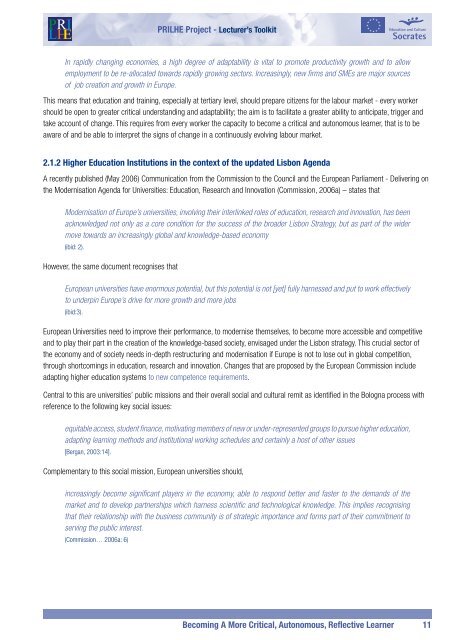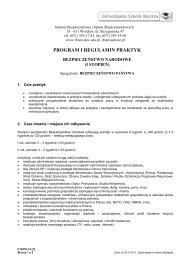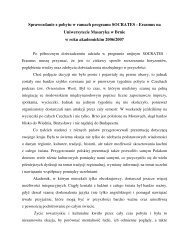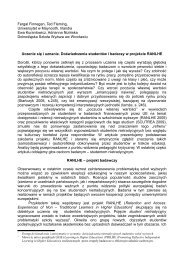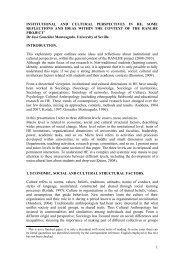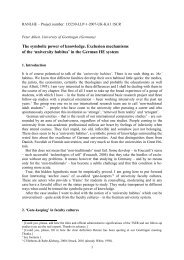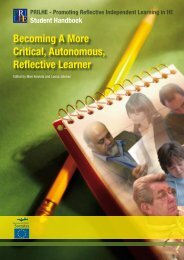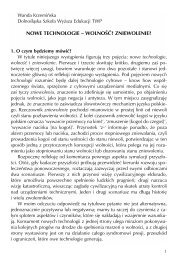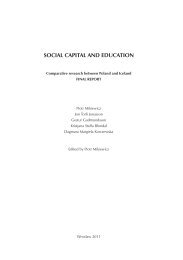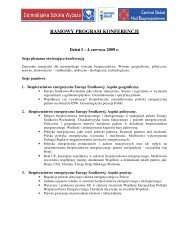Becoming A More Critical, Autonomous, Reflective Learner
Becoming A More Critical, Autonomous, Reflective Learner
Becoming A More Critical, Autonomous, Reflective Learner
Create successful ePaper yourself
Turn your PDF publications into a flip-book with our unique Google optimized e-Paper software.
PRILHE Project - Lecturer’s Toolkit<br />
In rapidly changing economies, a high degree of adaptability is vital to promote productivity growth and to allow<br />
employment to be re-allocated towards rapidly growing sectors. Increasingly, new firms and SMEs are major sources<br />
of job creation and growth in Europe.<br />
This means that education and training, especially at tertiary level, should prepare citizens for the labour market - every worker<br />
should be open to greater critical understanding and adaptability; the aim is to facilitate a greater ability to anticipate, trigger and<br />
take account of change. This requires from every worker the capacity to become a critical and autonomous learner, that is to be<br />
aware of and be able to interpret the signs of change in a continuously evolving labour market.<br />
2.1.2 Higher Education Institutions in the context of the updated Lisbon Agenda<br />
A recently published (May 2006) Communication from the Commission to the Council and the European Parliament - Delivering on<br />
the Modernisation Agenda for Universities: Education, Research and Innovation (Commission, 2006a) – states that<br />
Modernisation of Europe’s universities, involving their interlinked roles of education, research and innovation, has been<br />
acknowledged not only as a core condition for the success of the broader Lisbon Strategy, but as part of the wider<br />
move towards an increasingly global and knowledge-based economy<br />
(ibid: 2).<br />
However, the same document recognises that<br />
European universities have enormous potential, but this potential is not [yet] fully harnessed and put to work effectively<br />
to underpin Europe’s drive for more growth and more jobs<br />
(ibid:3).<br />
European Universities need to improve their performance, to modernise themselves, to become more accessible and competitive<br />
and to play their part in the creation of the knowledge-based society, envisaged under the Lisbon strategy. This crucial sector of<br />
the economy and of society needs in-depth restructuring and modernisation if Europe is not to lose out in global competition,<br />
through shortcomings in education, research and innovation. Changes that are proposed by the European Commission include<br />
adapting higher education systems to new competence requirements.<br />
Central to this are universities’ public missions and their overall social and cultural remit as identified in the Bologna process with<br />
reference to the following key social issues:<br />
equitable access, student finance, motivating members of new or under-represented groups to pursue higher education,<br />
adapting learning methods and institutional working schedules and certainly a host of other issues<br />
[Bergan, 2003:14].<br />
Complementary to this social mission, European universities should,<br />
increasingly become significant players in the economy, able to respond better and faster to the demands of the<br />
market and to develop partnerships which harness scientific and technological knowledge. This implies recognising<br />
that their relationship with the business community is of strategic importance and forms part of their commitment to<br />
serving the public interest.<br />
(Commission… 2006a: 6)<br />
<strong>Becoming</strong> A <strong>More</strong> <strong>Critical</strong>, <strong>Autonomous</strong>, <strong>Reflective</strong> <strong>Learner</strong> 11


